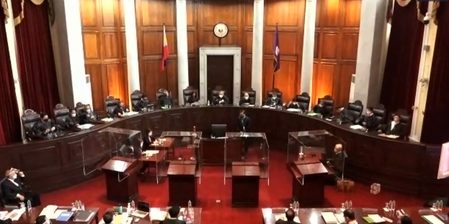SUMMARY
This is AI generated summarization, which may have errors. For context, always refer to the full article.
Retired chief justice Reynato Puno told the Supreme Court that there are “constitutional concerns” with the designation, detention, and surveillance powers of the feared anti-terror law.
“I’ve also expressed my constitutional concerns on different provisions of the anti-terror law, on the provision of designation, proscription, arrest without judicial warrants, on surveillance, on right to travel and other areas,” Puno said in open court during the 9th and final day of oral arguments on Monday, May 17.
Puno is one of the two amici curiae, Latin for friends of the court, which means he and retired justice Francis Jardeleza are the Court’s chosen experts who can help with the decision.
The provisions questioned by Puno are some of the most contentious powers in the anti-terror law, and his arguments against them are actually similar with some petitions.
But Puno disagreed that the anti-terror law should be struck down solely for being vague. Section 4, or the definition, is pointed to in petitions as the root cause of the law’s problems.
Government lawyers admitted in oral arguments that there was no definition in the anti-terror law for the “vague” standards of terror such as fear, intimidation, and extensive damage.
Puno said the petitioners’ arguments on this point did not pass the high threshold, saying “their valiant efforts fall short to justify striking down the whole Anti-Terror Law as unconstitutional on its face on the ground of vagueness or overbreadth.”
Puno disagreed with Jardeleza that the petitions should be junked just because they lack legal standing. (The recent designation of a petitioner – a peace consultant – as a terrorist, is being raised by petitioners as an actual case with legal standing.)
“I respectfully submit that it is best that the petitions at bar be resolved on the merit and not outrightly dismissed on the technical ground of lack of standing of the petitioners, because they are challenging a penal law that is allegedly void on its face,” said Puno.
Designation
Designation is a power of the anti-terror council, distinct from the court process of proscription. On its own determination, without notice to the subjects, the council can designate a group or a person as a terrorist and immediately freeze their assets.
“My apprehension is that the finding of probable cause may lack sufficient evidentiary basis. The finding of probable cause may critically hinge on intelligence information of doubtful admissibility or it may depend on classified information,” said Puno.
Designation under Section 25 also empowers the council to adopt the terror lists of the United Nations Security Council ( UNSC). A petition by international law experts pointed out that the UNSC resolution, which the anti-terror law cites, actually “violates the UN charter.”
Similarly, Puno said “the process followed by the UN Security Council in arriving at the list may not conform with our Constitution.”
“We are not aware how much of the process is open and how much is in camera. The standard of fairness in the listing process should be our legitimate concern,” said Puno.
Like what Associate Justice Benjamin Caguioa said during oral arguments, Puno added that designation disincentivizes the government from doing the court process of proscription.
“The use of proscription may not be the favored method by the executive authorities considering they have to hurdle the checking power of the judiciary,” said Puno.
Arrest and detention
Equally contentious is Section 29, or the power to arrest without a warrant, and the power of the council to authorize up to 24 days in detention.
Puno reminded the Court that for someone to be arrested, probable cause should have been established by the prosecutor as first level, and judge as second level.
“These two (2) levels of protection appear to have been taken away and given to the Anti-Terror Council, a body that cannot exercise judicial power,” said Puno.
“Under the Anti-Terror Act, the alleged terrorist appears to have lost all these levels of protection,” said Puno.
Puno also questioned how the prosecutor can have a role “when the Secretary of Justice is a member of the anti-terror council that ordered the arrest.”
This conflict has always put the Department of Justice in a precarious spot in the implementation of this law.
Surveillance
Under Section 16 or the surveillance provision, the government is authorized – with the permission of the Court of Appeals – to tap, surveil, intercept, or record private communications of a proscribed terrorist, a designated terrorist, or someone charged with terrorism.
Puno called this “bothersome.”
“First, it appears that persons already charged with terrorism can still be the subject of surveillance. The purpose is to gather evidence essential to his conviction. This runs against the conventional thinking that when a person is charged, the State has already the quantum of evidence to convict the person beyond reasonable doubt,” said Puno.
Puno added: “For the State to charge a person without that kind of evidence is plain and simple malicious prosecution or harassment, at the very least.”
The oral arguments concluded on Monday after Jardeleza and Puno delivered their amicus brief.
Jardeleza kept his brief simple – sticking to his advocacy of procedural rules, and advising the Court to simply junk the 37 petitions for lack of legal standing.
– Rappler.com
Add a comment
How does this make you feel?






There are no comments yet. Add your comment to start the conversation.